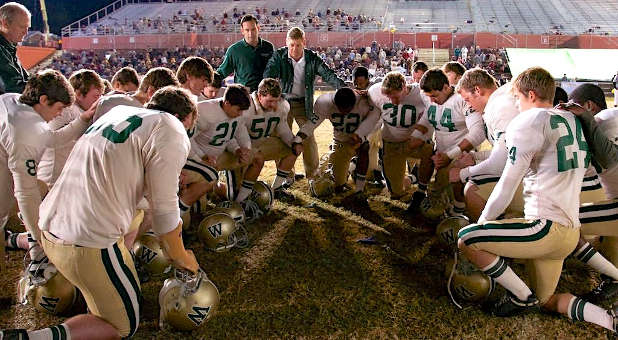I rarely endorse films, and I don’t get any benefit from movie companies if I do. But I loved the movie Woodlawn so much that I am telling everybody to see it before it leaves the local Cineplex. You will want to buy the DVD too, even if you aren’t a fan of high school football. Woodlawn is the most unapologetically Christian film I’ve ever seen because it maintains an artful quality without ever becoming cheesy.
American audiences are starved for films with positive messages that reinforce Christian faith instead of mocking it, and Hollywood has noticed that faith-based movies are getting better. War Room has already made $66 million since it released in August. Other faith-based films are due out in the next few months, including The 33 (about the miraculous 2010 rescue of Chilean miners, due in theaters Nov. 13) and Risen (about an unbelieving Roman soldier who investigates the resurrection of Jesus, out Jan. 22, 2016).
But Woodlawn, produced by Andrew and Jon Erwin, gets my vote for the best Christian film of the year because its message has relevance far outside the walls of the church. And it carries a prophetic message about the time we live in—which is really not that different from the turmoil of the early 1970s.
The film is set in 1973 in Birmingham, Alabama—at a time when local schools are required to desegregate. Racial tensions have reached the breaking point at Woodlawn High, a white school that suddenly must accommodate blacks. Students, parents, coaches and the school’s principal are all on edge.
People who remember the era of desegregation may also recall that another movement was stirring in America. Time magazine called it the Jesus Revolution. In Woodlawn, the two movements collide.
The school’s football coach, Tandy Gerelds (played by Nic Bishop), is trying to get his black and white players to get along, with no success. Then an unassuming evangelist named Hank (played convincingly by Sean Astin of Lord of the Rings) asks if he can give a pep talk to the boys in the school gymnasium. When he does, almost every guy on the team gives his life to Jesus.
“What just happened?” a baffled Coach Gerelds asks his assistant coach. Later in the film, Hank gives the answer: “This is what happens when God shows up.”
The film is based on true events and focuses on the life of one student, Tony Nathan (played by Caleb Castille), who becomes the first black football player for Woodlawn High. When he stands in the gym with the rest of his players and becomes a committed Christian, he doesn’t realize he’s joined a spiritual revolution. But with the word “BELIEVE” scribbled on the back of his helmet, and his index finger raised high to proclaim Jesus as the “one way” to heaven, he leads his team to unexpected victories—not only against opposing teams but also against a vile spirit of racism that has pervaded Birmingham.
The movie gets a special boost from veteran actor Jon Voight, who plays University of Alabama coach Paul “Bear” Bryant. He goes looking to recruit Nathan to play for the Crimson Tide, and in the process is impressed with the young man’s faith. After someone burns a cross in front of Nathan’s home, Bryant pays a visit and tells him: “You know the difference between you and these people? They’re cowards. And you ain’t.”
Woodlawn is 100 percent inspiration, but it never stoops to being sugar-coated—even when Coach Gerelds walks into a black church and tells the folks he has given his heart to Christ. You could show this film in a Sunday school class, but it has just as much appeal to secular audiences because the acting is first-class, the production values are masterful and the anti-racism message is as needed today as it was in 1973. It’s similar in tone to Remember the Titans or The Blind Side, but neither of those films have this much heart.
The film also includes actual footage of a Billy Graham sermon at Explo ’72, a huge gathering of young Christians that took place in Dallas and galvanized the Jesus movement. Those images reminded me that during one of the darkest times in American history—when white supremacists were bombing churches in the South and police were spraying black protesters with fire hoses—the gospel was being preached as the only means to achieve racial healing.
Historians have already proven that the young people who came to Christ during the Jesus movement eventually became the leaders of today’s church. It was the most powerful move of God in our lifetime. For me, Woodlawn not only chronicles how God poured out His Spirit in one school in Alabama—it also reminds me that He can and will do it again.
See an error in this article?
To contact us or to submit an article






















